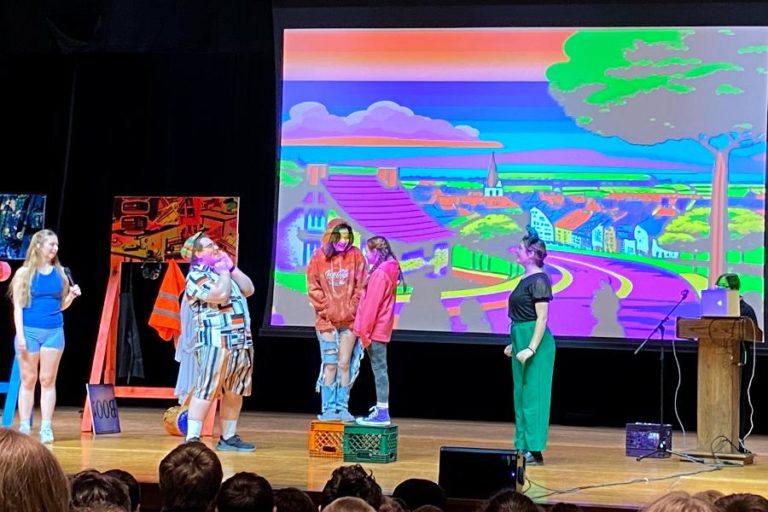Since early childhood, Evan Hill Phillips has always enjoyed the spotlight as he craved an outlet to create, entertain, and perform. At Michigan State University, the BFA in Theatre graduate discovered a whole new and innovative theatrical approach, one that is designed for audiences that are neurodiverse.
With an older brother who is neurodiverse and a first-hand knowledge of the industry’s lack of sensory-friendly productions, Phillips was personally motivated to help design shows that are accessible, inclusive, and welcoming for everyone.
Last fall, he was hired as a full-time Artist-in-Residence at the Center for Puppetry Arts in Atlanta, Georgia, where he works to bring sensory-friendly productions to the main stage.
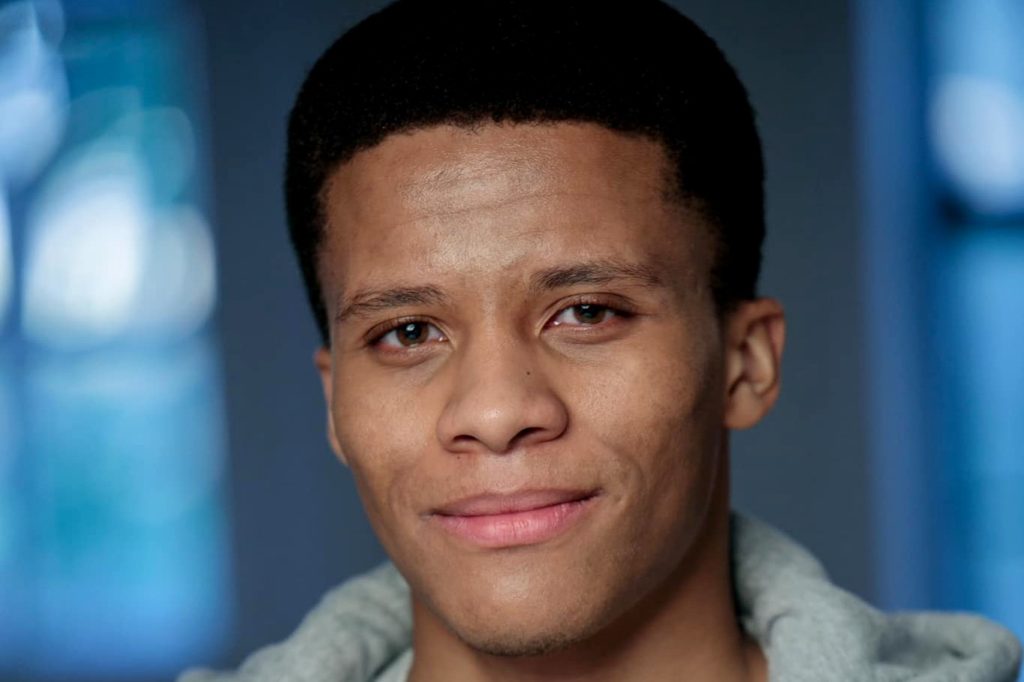
“Accessibility benefits everybody,” he said. “I certainly feel it’s important to make sure everything that we do as artists and as performers is inclusive and accessible for everybody. So, my major goal in this position has been to create more of that.”
His journey to build more inclusive theatrical spaces began during his time at MSU where he was a student volunteer for OpenSpot Theatre, a program that provides performance art education to neurodiverse individuals. During that time, Phillips had the opportunity to work with the Resource Center for Persons with Disabilities, which consulted with OpenSpot Theatre to help develop their programming.
“Accessibility benefits everybody. I certainly feel it’s important to make sure everything that we do as artists and as performers is inclusive and accessible for everybody.”
That experience led him to take a children’s theatre class taught by Academic Specialist Dionne O’Dell, in which the class created an original musical for children and young adults who are neurodiverse. The show, titled Farm! A Musical Experience, debuted in April 2017 and was one of the first productions nationwide written specifically to accommodate the neurodiversity of its audience.
“With Farm! we got a chance to create something that was geared towards an audience who needed a different way to engage with theater,” Phillips said. “It is a type of production that is more interactive, includes multisensory audience participation, and creates genuine one-on-one connections with participants.”
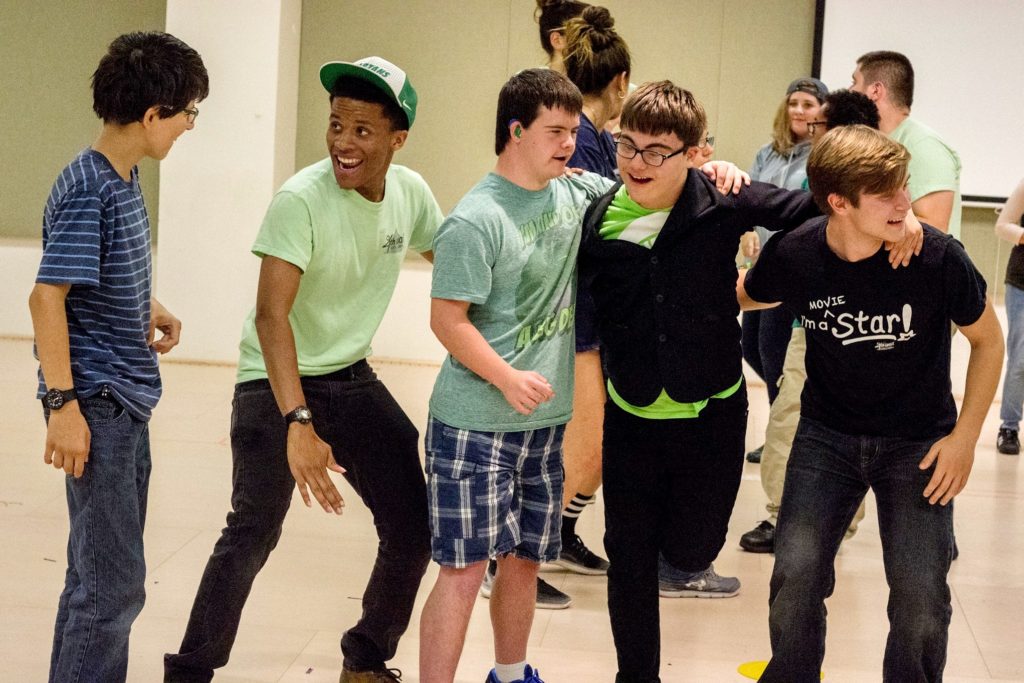
After graduating from MSU in 2018, Phillips accepted an apprenticeship with the Aurora Theatre in Lawrenceville, Georgia. He returned to MSU in 2019 to help develop and workshop a new sensory theatre piece called Pond in collaboration with the University of Michigan’s Department of Architecture. That same year, the Sense-Ability Ensemble was established by many of the original members of Farm!, which creates multisensory, interactive theatrical performances specifically designed for audiences that are neurodiverse, and Phillips was named an Associate Artist for the ensemble.
“MSU was one of the very first theatrical education departments that cultivated this type of work,” he said. “So, when I came to Georgia, my primary goal was to bring this type of work, if not Farm! specifically, to the southeast.”
Once in Georgia, Phillips held an apprenticeship with the Aurora Theatre in Lawrenceville, where he worked as an accessibility consultant for local theatre productions looking to become more sensory-friendly. He credits his time with the Aurora Theatre and a workshop they held in collaboration with the Center for Puppetry Arts as being the catalyst for his interest in puppetry.
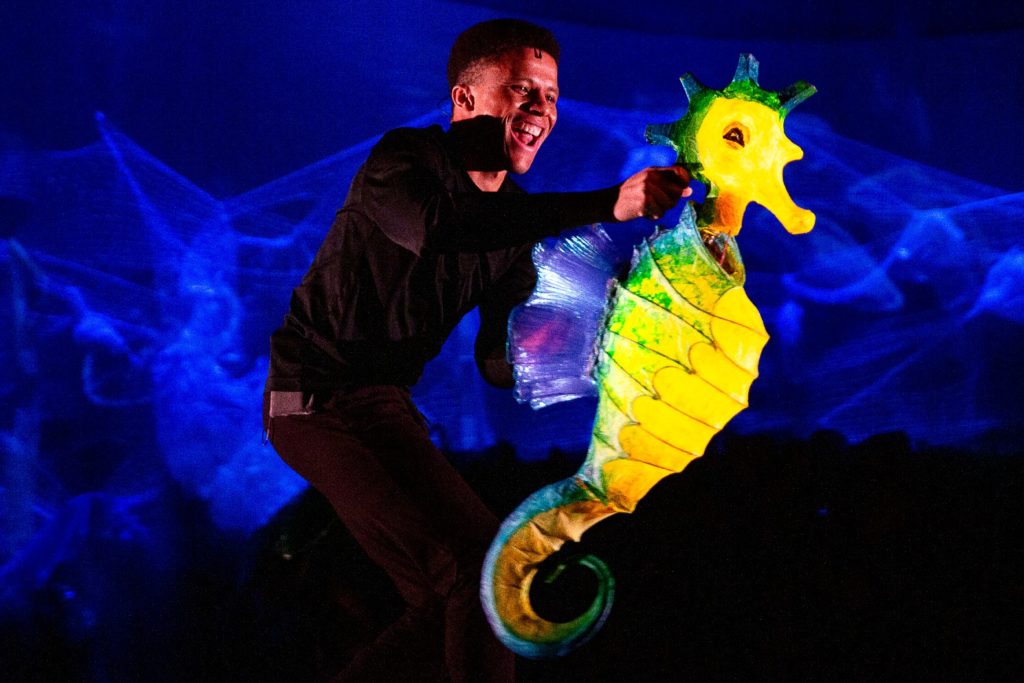
“I always had an interest in puppetry. I grew up watching shows like Sesame Street, The Muppets, and Bear in the Big Blue House, and it was really cool to see how it’s done at a professional level,” Phillips said. “It turned out to be something more involved, particular, and articulate. I was blown away by it and fell in love instantly.”
After the workshop Phillips began working more consistently with the Center for Puppetry Arts, promoting the center at events and working on some productions and was offered the position of Artist-in-Residence in October 2023. The offer was a welcome surprise as he said his work with the center prior to that was solely for the “love of the gig.”
“We learned that puppetry has a huge impact on those on the autism spectrum since they have the ability to interact with a character that they can make eye contact with, but not necessarily feel super stressed about interacting with them.”
As an Artist-in-Residence, Phillips sits in on production meetings, performs in shows, pitches ideas for future shows, and suggests ways the center can promote accessibility. Currently, the center is planning to not only increase the accessibility of current productions but also to create a new production geared toward neurodiverse audiences.
“We learned that puppetry has a huge impact on those on the autism spectrum since they have the ability to interact with a character that they can make eye contact with, but not necessarily feel super stressed about interacting with them,” Phillips said. “There’s just something about puppets that really opens up all types of audiences to interaction and engagement with them.”
Other elements of sensory-friendly theatre that Phillips is working to bring to the center include more animation, live music that incorporates the band into part of the on-site production, and interactive sets that allow the audience to move around in the production while relying less on loud sounds, harsh lighting, and strobe lights.
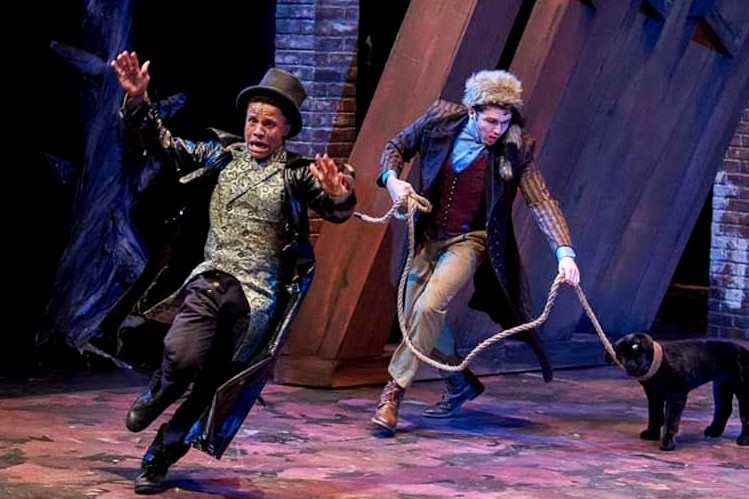
The Center for Puppetry Arts also provides a narrative, step-by-step description of its neurodiverse productions on its website, which, along with including plot details, outlines what audience members can expect during the production.
As Phillips moves forward in his career, he is thankful for all the opportunities and the people he met at MSU. He still keeps in contact with his Sense-Ability Ensemble crew, which is looking to collaborate on a project in the near future.
“My experience in the Department of Theater at MSU is just as relevant today as it was during my undergrad,” Phillips said. “I’m still working alongside the professor (Dionne O’Dell) who helped me develop this work and allowed me to learn how to bring this type of theatre to every venue and opportunity I find myself in. I definitely wouldn’t be who I am today, professionally or personally, without my experience and without the friends that I made at Michigan State. It was important then, and it’s super important now.”
The latest production of the Michigan State University Department of Theatre’s Sense-Ability Ensemble, What if Wilhelmina, has three upcoming performances scheduled for March 15-17 at the Arena Theatre in the MSU Auditorium Building. For more information, see the article, “MSU Theatre Presents ‘What if Wilhelmina,’ a Sensory-Friendly, Interactive Musical,” published by the College of Arts & Letters.


